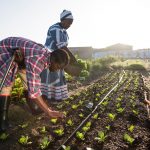Children who grow up in poverty are more likely to experience poverty in their adult lives, manifesting intergenerational poverty traps. Studies with long-term panel data show that the poverty status of households in their childhood is associated with their human capital, occupational choice, income, as well as their age of marriage, fertility, and migration. While…
Youth
Education and Labour Market Dynamics in a Period of Rapid Education Expansion:
Recognizing the need for policies that address poverty and inequality and build social cohesion, the Ghanaian government rolled out free compulsory primary education in 1996 and free senior high school provision in 2017. With the first cohorts exposed to the free education policies now reaching prime adulthood, our project aims to take stock of how…
Meet Your Future: Job Search Effort and Aspirations of Young Jobseekers
The Meet You Future Project (MYF) is an ongoing RCT designed in partnership with BRAC Uganda to investigate the relative importance of several barriers to quality employment that students face when transitioning from the educational sector into labor markets characterized by high levels of informality. The experimental setting is that of Vocational Training Institutes (VTIs) in…
Impacts of Microfranchising on Young Women’s Occupational Choices
Youth underemployment is a major challenge facing developing nations, particularly in Africa (Filmer and Fox 2014). Young people are more likely to be unemployed than older adults (Kluve et al. 2016). In low-income countries, unemployment figures also typically underestimate the proportion of youths who cannot find productive jobs (Fares et al. 2006). After leaving school,…
Transitions to Adulthood
Increasing schooling, delaying marriage and childbearing, and increasing labour market participation of young women are important policy objectives in Senegal as in many developing countries. These outcomes are tightly linked. Early childbearing may inhibit women’s ability to enter the labour force. Greater schooling and enhanced skill development may substantially mitigate these negative outcomes by increasing…
Addressing Gender Inequalities in Earnings and Productivity in Sub-Saharan Africa through Innovative Approaches
Youth employment and micro, small and medium sized enterprise (MSME) development are often in the public debate. Governments in Africa have introduced a number of programmes to promote employment via these mechanisms, but the understanding of which interventions are most effective and for which types of individuals they have an impact is limited. Furthermore, women…
High-Risk Youth in Post-Conflict Liberia
How can governments and NGOs raise employment and reduce the risk of violence among these poor and risky populations? Aid programmes increasingly focus on helping youth through markets, especially through microenterprise development. The logic of this assistance, however, rests on the existence of market failures among the poorest of the poor: imperfect credit markets, or…
Start-Up Capital for Youth
Unemployment among young people is one of the most pressing social and economic problems facing less developed countries today. Data from the 2005 Kenya Integrated Household Budget Survey found that approximately 21% of youths are unemployed, and a further 25% are neither in school nor working. While the traditional academic schooling track offers large labour…
Asymmetric Information on the Skills of Workers and Matching in the Labour Market
Youth unemployment is a serious issue in developing countries, where around 60% of young people are currently unemployed or underemployed [ILO 2013]. Understanding the determinants of youth employment in LICs is thus highly policy relevant, not just for policies related to labour market functioning and attachment, but also for those debates related to the incentives…








